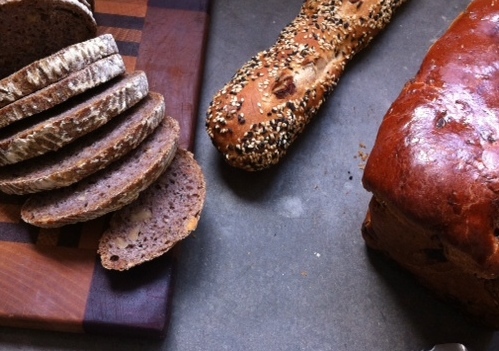
Last fall I sat with my 13-year-old daughter Rosie as she hosted a bake sale at our neighborhood farmers' market. At one point, a darling girl of about 3 toddled up to eye the cookies, quick breads, and granola that Rosie and I had baked for the occasion. Hovering over her was the girl's mother who scrutinized every item on the table, knitting her brows together and asking, "Is there gluten in this?" in a tone that suggested my daughter was hawking donuts dusted in arsenic.
It was completely reasonable for this woman to inquire about ingredients, particularly if she has a gluten intolerance or celiac disease. The problem was the air of judgement, as if only a crazy person would eat a slice of bread. It's a "holier than thou" vibe that seems common these days as celebrities, fitness gurus, and the media trumpet various diets with almost religious zeal. Most virtuous, it appears, is to sustain oneself on some combination of gluten-free, dairy-free, grain-free, sugar-free, and/or meat-free eating. This frenzy of fixation on certain ingredients is often accompanied by across-the-board categorization of foods as "good" or "bad." Last week the comedian Jimmy Kimmel did a very funny bit on his late night show about eating gluten, which he said, "in L.A. it's comparable to Satanism."
Let's have a little perspective here about what "bad" really looks like. Babies who are bottle fed Coca Cola because their parents haven't been educated otherwise -- that's bad. Children who routinely go to school without breakfast in their bellies because the pantry at home is empty -- that's bad. But a slice of homemade, whole grain cranberry bread sold at a bake sale to raise money for charity? Not bad.
Fearmongering around particular foods and rigid mindsets about what we should all be eating does a disservice to the public. Microfocusing on whether quinoa is better than barley is not going to solve our country's dietary ills. It's a distraction from the bigger picture of what healthful eating really is, which in part, is a personal matter. My best friend may be gluten-intolerant, my mom may prefer to lay off sugar, I may have a tricky time digesting milk, and my boot camp buddy might avoid animal protein, but that doesn't preclude every one of us from eating very very well.
Eating real food without heavy reliance on the packaged goods aisle, ideally savored in the company of people you care about? That matters a whole lot more than whether the milk you are drinking came from a goat or an almond.
This post originally appeared on Katie's blog, Mom's Kitchen Handbook, where you can find recipes and tips for feeding a family. You can also follow her on Instagram @KatieMorford
